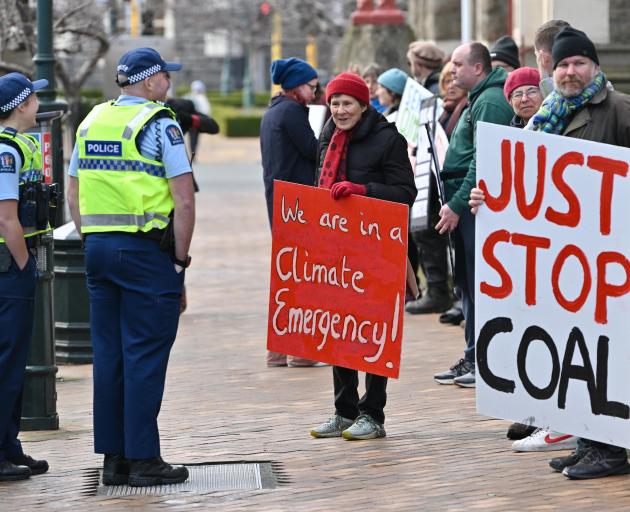
The trial for the members of Extinction Rebellion, before Judge David Robinson in the absence of a jury, began in the Dunedin District Court yesterday.
Abigail Katrina Libby, 45, Bruce Bertram Mahalski, 61, Fay Margaret Brorens, 66, Timothy Richard Musson, 54, Anne Margueretta Smith, 75, and Joanne Kathleen Sutherland, 56, pleaded not guilty to a range of charges including trespass and obstructing rail employees.
Prosecutor James Collins said the police case regarding the 2021 incident was "relatively uncomplicated" and much of the sequence of events had been agreed by the parties.
Video footage of the episode was also available as evidence.
Defence counsel Thomas Harre and Ben Nevell indicated the defence would centre on legal arguments incorporating the Bill of Rights Act and the criminal doctrine of necessity.
The defendants were arrested on December 4, 2021, after blocking a coal train and inadvertently causing the cancellation of the Victorian excursion train to Oamaru.
Mahalski, at the time, said the target of the protest was carrying 500 tonnes of coal to Fonterra’s Clandeboye factory near Temuka, to turn milk into powder for export.
There were several people on the tracks outside the railway station and north of the St Andrew St level crossing, both in front and behind the train.
Other protesters climbed on top of carriages, the court heard.
The area’s KiwiRail operations manager at the time, Jamie McFarland, told the court that the train was unable to move forwards or backwards, and because protesters were lying on the tracks, no other locomotive could get around them because they might have been "crushed".
He said the driver of the train locked himself in — a policy developed after members of the group had previously attempted to gain access to the cab.
Mr McFarland told the court it was the 15th or 16th time he had responded to the group’s protest actions within a year.
Some of the interactions were amicable but he said on other occasions he was assaulted — including allegedly being "shoulder charged" while on crutches on the day in question — and verbally abused.
"It varied, essentially, depending on who was there on the day and what their state of mind was," Mr McFarland said.
When asked whether he had become frustrated with protesters by December 2021, he was forthright.
"It took me away from my family at Christmas. I was not happy," he said.
Senior Sergeant Anthony Bond attended the scene and described issuing warnings to protesters both on the train and the tracks, some of whom were connected by metal devices.
Those who did not leave voluntarily were arrested.
Mr McFarland said delays lasted more than three hours and three services were cancelled as a result of Extinction Rebellion’s actions.
The coal train continued to its destination within the next two days.
The trial is expected to last several days and Mr Nevell said he would be calling five witnesses, including atmospheric and climate scientist Dr Greg Bodeker.











